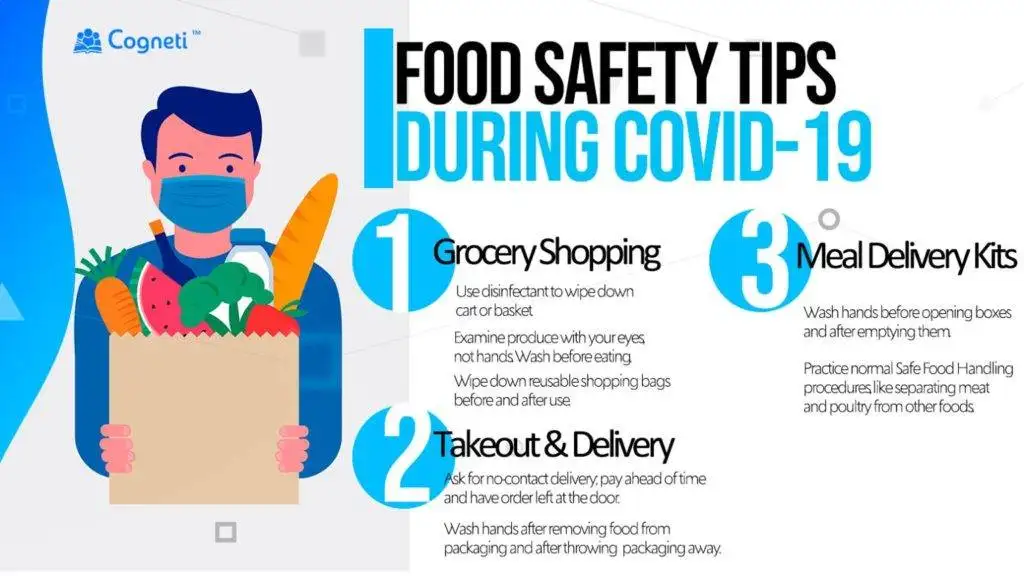
As the new coronavirus, COVID-19, sweeps the United States, many people feel anxious about routine aspects of everyday life, such as grocery shopping. If you wonder whether you might pick up COVID-19 from food or food packaging, you’re not alone. And what about food delivery packaging? Are meal kits or restaurant meals delivered by courier safe?
Experts Say Food Is Safe
This anxiety surrounding food may be heightened by the fact that research is somewhat lacking about how COVID-19 travels from person to person. Currently, the Centers for Disease Control and Prevention (CDC) says this transmission occurs through droplets: the microscopic particles emitted when someone coughs or sneezes. Contact (surface) transmission does not seem to happen often with COVID-19, and there is no evidence at all that it is transmitted through food or food packaging.
“Food itself isn’t likely to be a route by which coronavirus spreads easily, so the actual food you get in the package should be safe,” says Verywell Health Medical Review Board Member Andy Miller. “The packaging on the food—the plastic wrap on the chicken, for instance—might theoretically have some coronavirus on it, if the person packaging the chicken, or handling the packaged chicken, was infected. That’s possible, but not a very likely vector for transmission.”
Grocery Shopping
Although experts do not believe food or food packaging transmit COVID-19, you should still take steps to reduce your risk as much as possible. Consider using grocery pickup or delivery, if possible, to avoid contacting other people inside a grocery store. If you must shop in person, try these strategies:
- Prepare a list in advance so you can get in and out of the store quickly.
- Wash your hands before and after you go into the store.
- Use disinfectant to wipe down the handle of the cart or basket, as well as adjacent surfaces.
- Maintain at least six feet of distance between yourself and other shoppers as best as you can.
- Evaluate produce items only with your eyes. Avoid touching them, other than to place them in your basket. Consider using hand sanitizer before and after choosing your produce items.
- Wipe down reusable shopping bags inside and out with a disinfecting wipe before and after each use. If using washable totes, wash them after each use.
- Dispose of single-use grocery bags (if using) immediately after shopping.
- Wash produce items thoroughly using plain water or a produce wash product before eating.
Takeout, Drive-Through, and Delivery
Not only is ordering takeout from a local eatery likely safe, but you’ll be providing vital economic support to these hard-hit businesses.
“Restaurants doing takeout/delivery should be following the same precautions for their employees that are recommended for other businesses: social distancing, frequent handwashing, frequent cleaning of high touch surfaces, etc.,” says Verywell Health Medical Review Board Member Anju Goel
That said, you should use handwashing precautions to avoid the remote possibility of picking up COVID-19 from the takeout packaging. Follow this procedure:
- Wash your hands or use hand sanitizer before picking up a takeout order. If having food delivered, opt for “no contact” delivery, paying ahead of time and asking for your meal to be left at the door.
- Wash your hands again before removing food from the packaging at home.
- Wash your hands after eating the food and disposing of the packaging.
Meal Delivery Kits
Using meal kits like Blue Apron, Purple Carrot, or Home Chef can be an excellent way to enjoy nutritious, home-cooked meals while avoiding congregating with people at a grocery store. These food subscription services deliver boxes to your doorstep with ingredients you need to eat well during quarantine.
“Meal kits are likely safer than standing in line with your cart at the grocery store,” says Verywell Health contributor Robyn Correll Carlyle, MPH. “While there’s still a lot we don’t know for certain, the new coronavirus doesn’t appear to be transmitted through food. I think the bigger risk might be if someone infected with the virus is preparing the kits or handling them in the process of shipping. “
Minimizing Meal Kit Risks
To minimize your risk from handling meal kits, follow these tips:
- Wash your hands before opening the boxes.
- Immediately place cold items in the refrigerator.
- Observe safe food handling procedures, such as separating raw poultry from other foods during preparation.
- Wash your hands after emptying the box and putting away the contents.

